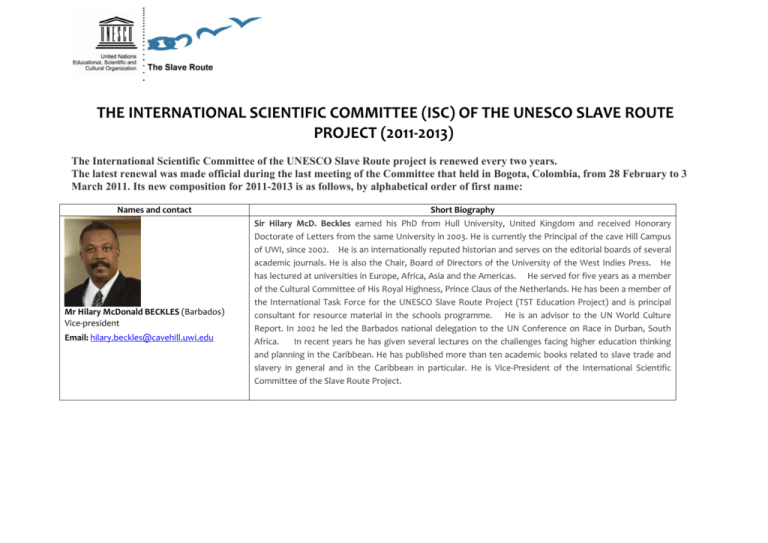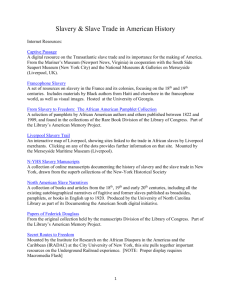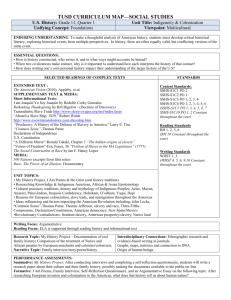the international scientific committee (isc) of the unesco slave route
advertisement

THE INTERNATIONAL SCIENTIFIC COMMITTEE (ISC) OF THE UNESCO SLAVE ROUTE PROJECT (2011‐2013) The International Scientific Committee of the UNESCO Slave Route project is renewed every two years. The latest renewal was made official during the last meeting of the Committee that held in Bogota, Colombia, from 28 February to 3 March 2011. Its new composition for 2011-2013 is as follows, by alphabetical order of first name: Names and contact Mr Hilary McDonald BECKLES (Barbados) Vice‐president Email: hilary.beckles@cavehill.uwi.edu Short Biography Sir Hilary McD. Beckles earned his PhD from Hull University, United Kingdom and received Honorary Doctorate of Letters from the same University in 2003. He is currently the Principal of the cave Hill Campus of UWI, since 2002. He is an internationally reputed historian and serves on the editorial boards of several academic journals. He is also the Chair, Board of Directors of the University of the West Indies Press. He has lectured at universities in Europe, Africa, Asia and the Americas. He served for five years as a member of the Cultural Committee of His Royal Highness, Prince Claus of the Netherlands. He has been a member of the International Task Force for the UNESCO Slave Route Project (TST Education Project) and is principal consultant for resource material in the schools programme. He is an advisor to the UN World Culture Report. In 2002 he led the Barbados national delegation to the UN Conference on Race in Durban, South Africa. In recent years he has given several lectures on the challenges facing higher education thinking and planning in the Caribbean. He has published more than ten academic books related to slave trade and slavery in general and in the Caribbean in particular. He is Vice‐President of the International Scientific Committee of the Slave Route Project. M. Abdelilah BENMLIH (Morocco) E‐mail : benmlih_abdelilah@yahoo.fr Mr Felix A. CHAMI (Tanzania) E‐Mail: fchami@udsm.ac.tz Mr. Toyin FALOLA (Nigeria) Vice‐President E‐mail : toyin.falola@mail.utexas.edu Abdelilah Benmlih is historian, professor at the Sidi Mohamed Ben Abdellah University of Fès, Morocco. He is Director of the Research Centre for Analytical bibliography and documentation of the Maghreb Heritage. He worked on slavery in Maghreb and in Andalusia (XI and XII Centuries). His book entitled "L’esclavage au Maghreb et en Andalousie" [Slavery in Maghreb and Andalusia] was awarded the 2005 Morocco Book Prize on Social and Human Sciences. His work on slavery in Muslim societies and namely on the general say about the status of slave has contributed to break the silence on this tragedy in the Arab‐Muslim World. Felix Chami is a renowned archaeologist. He is a professor at the University of Dar‐es‐Salaam, Tanzania and the General Coordinator of African Archaeology Network involving 13 African countries. He is the discoverer of the earliest settlements of the Islands of East Africa dating back through Neolithic period to earlier Stone Age periods, 30,000 years ago. He has examined issues of slave trade and excavated Bagamoyo, one of slave trading towns of Eastern Africa. He has also demonstrated Egypto‐Greaco‐Roman trade with the eastern African Indian Ocean settlements. He has published a number of books, the most recent ones being The Unity of African Ancient History (2006) and Zanzibar and the Swahili Coast from 30,000 Years Ago (2009). His work contributes to a better knowledge of the slave trade in this region through archaeological evidence. Toyin Falola (Nigeria) is Professor in History and a Distinguished Teaching Professor at the University of Texas at Austin. He is a Fellow of the Historical Society of Nigeria and A Fellow of the Nigerian Academy of Letters. He has produced an extensive work on the slave trade and slavery in west Africa in general, with particular focus on the trade in Nigeria. Toyin Falola has published numerous books, including Key Events in African History: A Reference Guide, Nationalism and African Intellectuals, and many edited books including Tradition and Change in Africa and African Writers and Readers. He is the co‐editor of the Journal of African Economic History, Series Editor of Rochester Studies in African History and the Diaspora, and the Series Editor of the Culture and Customs of Africa by Greenwood Press. He is Vice‐President of the International Scientific Committee of the Slave Route Project. Mrs Ana FREGA (Uruguay) E‐mail : anafrega@gmail.com Ana Frega has a Ph.D. in History from the University of Buenos Aires; she is Professor and Director of the Department of History of Uruguay, Faculty of Humanities and Educational Sciences, University of the Republic. She is the focal point for Uruguay for the implementation of the second phase of the "Slave Route" project with, among other tasks, developing or monitoring technical reports on the "memory sites" linked to the presence of African descent in Uruguay and to promote and participate in forums for dialogue and exchange with various institutions and public‐private partnerships, especially the African group. Her research interest includes the revolution to independence period and state building processes in the Río de la Plata, with respect to the participation of different social groups in this process, and with particular focus on "History of African descent in Uruguay". She is developing a thematic network in the University of the Republic on "Afro‐descendants in Uruguay". She is involved in several ongoing projects addressing the history of African descendants and has a large contribution with book chapters and articles on this issue. Michael Gomez is professor of History, Department of History and Department of Middle Eastern and Islamic Studies, New York University. He is Director of the Association for the Study of the Worldwide African Diaspora (ASWAD) and Chair of the Department of History, New York University. He is member of several other Editorial Board Journals and fellowship committees. Mr. Michael A. GOMEZ (USA) E‐mail : michael.gomez@nyu.edu Mr. Milton GURAN (Brazil) E‐mail : miltonguran@gmail.com Milton Guran is anthropologist. He holds a PhD from the Ecole des Hautes Etudes en Sciences Sociales (EHESS) in Paris and teaches at the University of Brasilia. He is associate researcher at the Centre for Afro‐ Asian Studies of the University of Candido Mendes. He is also a photographer, Associate researcher at the Laboratory of Oral History and Photography ‐ LABHOI University Federal Fluminense (Rio de Janeiro ‐ Brazil). His particular research interest is on the Agoudas, a people who were enslaved in Brazil and which returned back to settle in Benin after abolition period. He realized two exhibitions dedicated to the Afro‐Brazilians and their relation with Africa, one of which was presented during the Brazilian’s President visit to Africa in 2010. Mr Jesús GUANCHE PERÉZ (Cuba) E‐mail: jguanche@cubarte.cult.cu Mrs Mari HAREIDE (Norway) E‐mail: Mari.Hareide@kd.dep.no Mr. Michel HECTOR (Haiti) Vice‐President E‐mail: itineraires@hotmail.com Jesús Guanche is historian. He holds a Degree in History of Art and Ph.D. in Historical Sciences (with specialization Cultural Anthropology). Researcher at the Fernando Ortiz Foundation, Assistant Professor at the University of Havana and the Instituto Superior de Arte. He is also the Coordinator of the Cuban National Committee for the Slave Route. He has an extensive publication on the issue of slave trade and slavery in Latin America and the Caribbean, with a particular focus on Cuba. He has been a visiting professor and lecturer at universities in Brazil, Spain, United States of America, France, Italy, Dominican Republic, Nicaragua, Russia, Switzerland and Norway. Mari Hareide was Secretary General of the Norwegian National Commission for UNESCO 1993‐2004. She is now Senior Adviser with the Ministry of Education and Research where she deals with European Union research issues and bilateral research agreements with India and the USA in addition to being the Coordinator of the National Commission for UNESCO in Norway. She played an active role in establishing the UNESCO Slave Route Project’s TST ASPnet Education programme, and coordinated the Norwegian schools’ participation. Mari Hareide was a visiting Fellow at The Gilder Lehrman Center for the Study of Slavery, Resistance and Abolition, Yale University, in the spring term of 2007. During the 6 months at Yale, she worked closely with the American TST, took courses and attended conferences and lectures on slavery issues. Mari Hareide was a member of the International Task Force for the TST Education Project of UNESCO’s Slave Route Project. Her good mastery of the dynamics of the Transatlantic Education Programme within the Associated School Network is a particular asset to this Committee. Michel Hector is professor of History at the State University of Haiti (), he is Director of the Centre for Historic and Sociologic Researches (CREHSO) at the Faculty of Human Sciences of the State University of Haiti. He is also Member of the Haitian National Committee for The Slave Route Project and President of the Haitian Society of History and Geography. He chaired the Committee for the commemoration of the bicentenary of Toussaint Louverture's action, as well as the Commission for the commemoration of the decade for the bicentenary of independence of Haiti, Member of the UNESCO Chair – History of slavery in Haiti. Mrs. Shihan de Silva Jayasuriya (Sri Lanka) E‐mail : shihan.desilva@sas.ac.uk Mrs. Michele A. JOHNSTON (Canada) Rapporteur E‐mail : johnsonm@yorku.ca Mr Joel QUIRK (UK) Rapporteur Email: j.quirk@hull.ac.uk Shihan de Silvais professor of History, Senior Fellow of the Institute of Commonwealth Studies of the University of London., she is co‐Founder of the African Diaspora in Asia (TADIA), Founding Member and Adviser for the International Advisory Board, Research Institute for the Study of Slavery and Indenture, Mauritius; the Editorial Board, An Encyclopaedia of the African Diaspora, ABC‐CLIO, California, USA, Member of the Institute of Historical Research, University of London. She has also served as Rapporteur for the International Scientific Committee of the Slave Route Project (2008‐2010). Michele Johnston is Associate Professor in the Department of History, York University where she has served as the coordinator of the Latin American and Caribbean Studies Programme and currently serves as the university’s Affirmative Action Officer and a Deputy Director of the Harriet Tubman Institute. She currently directs a new initiative, "Spotlighting and Promoting African Canadian Experiences" (S.P.A.C.E.) which seeks to highlight the presence and contributions of persons of African descent in Canada over the last 400 years. She teaches a variety of courses which focus on "Blacks in the Americas". Her research interests have adopted many of the themes which circulate around issues of gender relations, race/radicalization and labour and which have resulted in a long‐standing interest in domestic slavery and service in Jamaica/the Caribbean, the United States and Canada: this has resulted in the publication of six articles and a monograph which is in progress. Joel Quirk is Deputy Director of the Wilberforce Institute for the study of Slavery and Emancipation, and RCUK Fellow in Law, Culture and Human Rights, University of Hull. His research primarily focuses upon the relationship between the history of slavery and abolition and contemporary forms of human bondage. Joel is the author of Unfinished Business: A Comparative Survey of Historical and Contemporary Slavery (UNESCO, 2009) and The Anti‐Slavery Project: From the Slave Trade to Human Trafficking (University of Pennsylvania Press, 2011). He is currently working on a number of research projects concerned with slavery and national identity, repairing historical wrongs, the state and mobility in Africa, teaching modern slavery, the definition of slavery under international law, and the historical relationship between wartime enslavement and forced marriage. Joel holds a Ph.D in Political Science and International Relations from the Australian National University. Mr Ignace RAKOTO (Madagascar) Email: rakotoignace@moov.mg Mr Jaime AROCHA RODRÍGUEZ (Colombia) E‐mail : jaime.arocha@gmail.com Mrs. Nelly SCHMIDT (France) E‐mail : nelly.schmidt@wanadoo.fr Ignace Rakoto is lawyer and historian, lecturer at the University of Antananarivo. Currently at the Institute of Museum of Civilization, Art and Archaeology, has edited two books: "L’esclavage à Madagascar: aspects historiques et résurgences contemporaines" (Institut géographique national FTM, 1997) and La route des esclaves. Système servile et traite dans l’Est malgache (L’Harmattan, Paris, 2001). He lectures the history of the judiciary and justice in the National School of Judges and Court, Antananarivo, and has published a book on court decisions in Madagascar (1841‐1896) (L'Harmattan, Paris, 2009). Jaime Arocha holds a Ph.D in cultural anthropology from Columbia University in New York (1975) and is Professor of Anthropology and Director of the "Grupo de Estudios Afrocolombianos" at the National University of Colombia. Recent study includes rites of Afro‐Colombians and Raizales, held in conjunction with the National Museum of Colombia and the Ministry of Culture to set up the temporary exhibition Wakes and Living Santos, black communities, Afro palenqueras native islanders and between the August 21 and November 2, 2008. His areas of interest are Cultural Anthropology, Cultural and mental ecology, Visual anthropology, History of anthropology in Colombia, Africa in America. His current research areas combine rural violence, racism and racial discrimination, traces of Africans, evolution of peoples of African descent in the Americas, funeral rituals of black people, Afro‐Colombian, "Palenquera" and "raizal". Nelly Schmidt is historian, Director of Research at the Centre National de la Recherche Scientifique (cnrs), Centre R. Mousnier, Histoire et Civilisation, University of Paris IV‐Sorbonne; Coordinator of the UMR 8596 (CNRS) Program dedicated to the theme "Slavery, abolitions, abolitionists, colonial policies, XVIII‐XX cent.". She is member of the Doctoral School of Contemporary History (Paris IV), and member of the Centre de Recherches Caraïbes‐Amériques (CERCAM). Nelly Schmidt specializes in the history of abolitions and abolitionists of slavery, the work of Victor Schœlcher, history of the Caribbean Americas and European colonial policies (XVIII‐XX cent.). Her last book, La France a‐t‐elle aboli l’esclavage? 1830‐1935 (Paris, Perrin, 2009), is a study of the French colonial policy in the Caribbean. She is currently preparing a book about slave life on a French Caribbean plantation, and the edition of a Corpus of documents about slavery and abolitions. Mr. Simao Souindoula (Angola) E‐mail: souindoulasimao@yahoo.fr Mrs. Bridget R. THOMPSON (South Africa) Email: tomasfilms@yahoo.com Mr. Jordi TRESSERRAS Juan (Spain) E‐mail ibertur@gmail.com Simao Souindoula (Angola) is historian, Director of National Museum of Slavery, Luanda and Coordinator of UNESCO’s Angolan Board for The Slave Route Project. He is member of various other international scientific institutions and administrative boardcast, author of hundred of comparative and monographic works on various aspects of slave trade and slavery and its consequences, ranking from historic evolution, anthropologic and linguistic realities, as well as artistic expressions derived from in the Bantu Zone, the Americas and the Caribbean islands. Briget Rosamund Thompson is researcher, producer, writer and director of social documentary films. She is member of the African Cinema movement and has served in a number of international film festival juries and has been a consultant (through the HSRC) for the South African Ministry of Arts and Culture on African Cinema. She is interested in the twentieth century history and theory of social documentary film. Her work is rooted in South African and African social and cultural history, with a focus on the lacunae in documentation and intellectual understanding that result in silenced episodes of history such as apartheid. As educationalist, she built a solid experience as national audio‐visual coordinator of the SACHED trust where she also served at the publishing editorial board on The Right to Learn and Write your own history and on the SACHED National Coordinating Committee (NCC). She is actually exploring the question of a South African aesthetic, work is mainly organized through the Art and Ubuntu trust of which I am currently the executive trustee. Her varied activities cohere in her interest in the problems created by the decimation of black intellectual life in South Africa at the end of the 50’s and the failure, as yet, to reinstate a vigorous African intellectual leadership in South Africa. Jordi Tresserras is historian, Coordinator of Postgraduate program on cultural Management and Cultural Tourism at the University of Barcelona and Associated professor at the Faculty of Geography and History, University of Barcelona. He is founder and President of Network on Heritage, Tourism and Sustainable Development and Member of Board, UNESCO Chair "Culture, Tourism, Development". He is also Director of the International Laboratory of Cultural Routes of the UNITWIN Network; Member of ICOMOS and Founder of the Scientific Committee on Heritage Interpretation. Mrs. Maria Elisa VELAZQUEZ (Mexico) President E‐mail: mavelaz@prodigy.net.mx Maria Eliza Velazquez is professor at the Department of Ethnology and Social Anthropology of the National School of Anthropology and History in Mexico. Member of the National System of Researchers of the National Council of Science and Technology of Mexico; Professor of postgraduate studies at the National School of Anthropology and History focused in Cultural Diversity and People of African heritage in Mexico since 2001. Professor of postgraduate studies at the Ibero‐American University in Mexico since 1994. Since 1997, she coordinates the national and international researchers for the academic seminar Populations of African origin in Mexico at the Department of Ethnology and Social Anthropology of the National Institute of Anthropology and History in Mexico. Mrs. Velazquez is the new President of the International Scientific Committee of the UNESCO Slave Route Project.







